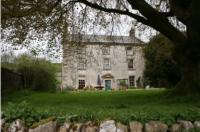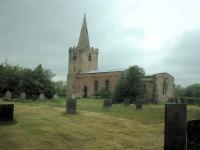
Nat Gould
His life and books
William Gould 1739-1795
| William Gould |
|---|
| Born: 1739 Pilsbury, Derbyshire |
| Died: 1795 Welbeck, Nottinghamshire |
| Father |
| Joseph Gould |
| Mother |
| Anne Slack |
| Siblings |
| Joseph Gould 1742-1763 |
| Richard Gould 1745-1762 |
| Spouse |
| Elizabeth Stone 1737-1812 |
| Children |
| Joseph Gould 1765-1825 |
| William Gould 1771-1826 |
| Mary Gould 1775-1777 |
William Gould was born in 1739 at Pilsbury Grange near Hartington in Derbyshire, the son of Joseph Gould (1) and his wife nee Anne Slack of Sheen in Staffordshire (2).
He was born into a long established family of tenant farmers. William Gould 1655-1725, the first of the family to take the lease of Pilsbury Grange, had divided the farm between his two eldest sons, William Gould 1677-1772 and Joseph Gould 1685-1760. The older son William Gould had the “Upper House” and the younger son Joseph Gould had the “Lower House” (3).
The present day Lower House was built in 1743 (4). It was in this house that William Gould lived in his childhood with his parents and it became his base in adult life.
From 1780 to 1795, as well as managing his own farm, he acted as agent for the Dukes of Devonshire and Portland and the scientist Henry Cavendish, supervising their estates. From 1783 to 1795 he kept a detailed Diary of his daily work, travel and health, and noted down his opinion of some of the people he encountered (5).
On 29 December 1763 William Gould married Elizabeth Stone of Stenson in Derbyshire at the nearby parish church in Twyford. She was born in 1737.
They had the following children:
Joseph Gould. He was born in 1765. He lived at Ludwell near Pilsbury, and also served as agent to the Dukes of Devonshire and Portland. He died on 13 March 1825 aged 60 years, and was buried at Hartington on 19 March 1825.
William Gould. He was baptised at Hartington on 28 December 1771. He died on 2 March 1826 at Gloucester Place, Camden Town in London, and was buried on 4 March 1826 at Bunhill Fields in London. His wife Mary died on 24 May 1862 aged 84 years.
Mary Gould. She was born in 1775. She died at Pilsbury aged two only years, and was buried at Hartington on 2 March 1777.
Their father William Gould died at Welbeck on 18 November 1795 aged 56 years (6), and was buried at Hartington on 21 November 1795.
His wife Elizabeth Gould died on 24 February 1812, and was buried in Nottingham.
(1) His father was Joseph Gould, but it is uncertain whether he was Joseph Gould 1685-1760 or a son of that Joseph Gould also called Joseph.
(2) She is also referred to as Amie, but that appears to be a misreading of Anne.
(3) These names were those used by Thomas Bateman 1760-1847, a great-grandson of William Gould 1655-1725, when compiling the family tree in the 1820s. The Upper House stands on slightly higher ground than the Lower House. Bateman was following what was told him by William Gould 1755-1845 of Hanson Grange, another great-grandson of William Gould 1655-1725. The names refer to the height above the river, rather than to their positions upstream or downstream in the Dove valley.
(4) Hartington Estate Accounts AS 1383: Devonshire Collections at Chatsworth.
(5) Four volumes of the detailed handwritten diaries that he kept from 1783 to 1795 have been transcribed and published. They paint a vivid picture of the working and social life of his period, and add character to many of the people, including himself, whose correspondence features in the papers of the Portland and Devonshire Collections. Thoroton Society Record Series volume 44 (2006). Ducal Estate Management in Georgian Nottinghamshire and Derbyshire: The Diary of William Gould, 1783-1788, edited by his descendant Michael Hanson, who owns the diaries.
Some two-thirds of them concern his work in Nottinghamshire and the remainder to Derbyshire and Staffordshire. His duties included letting farms, collecting rents, and planting woodlands. He refers to visits by the architect John Carr of York, and voices disapproval of extravagant proposals to extend Welbeck Abbey. The estate ice house and fire engine, and the trial of a new patent washing machine are mentioned. William Gould describes the Welbeck household servants as "a parcel of thieves and designing persons", and had an uneasy relationship with the famous Welbeck gardener, William Speechly.
His lifetime witnessed agricultural and industrial revolutions, and William Gould noted details of new cotton mills and the poaching of skilled mill workers, negotiations involved in the enclosure of commons, and disputes about turnpike roads. Theatre visits are recorded, and he includes a detailed description of the rioting during the county election at Nottingham in 1784. He travelled n all weathers, by horse, coach and chaise, about ten thousand miles from 1783 to 1787.
(6) "Died ... A few days ago at Welbeck, in Nottingamshire, aged 56, William Gould, Esq. Steward to his Grace the Duke of Portland; whose numerous tenantry will long lament the loss of so worthy a man." Derby Mercury 3 December 1795.


